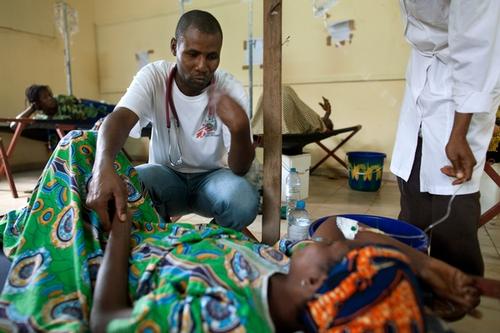Paris/New York, May 28, 2014 – An oral cholera vaccine protected individuals by 86 percent during a recent outbreak in Guinea, according to a study published today in the New England Journal of Medicine (NEJM).
The study, conducted by Epicentre, research arm of the international medical humanitarian organization Médecins Sans Frontières (MSF), and the Guinean Ministry of Health, is the first to show that this particular oral cholera vaccine provides protection very quickly, and lends support to its use in control of future outbreaks.
“Because we’d never documented the effectiveness of this new vaccine in real-life epidemic conditions, we didn’t have enough information to understand the potential of this vaccine as a tool to control a cholera outbreak,” said Francisco Luquero, principal investigator of the study. “Now we know that oral cholera vaccine confers a high level of protection in outbreak settings, and that vaccinating against this highly deadly disease can and should be one thing we do when we have a cholera epidemic on our hands, in addition to other preventive and control measures.”
The vaccine is being stockpiled by the World Health Organization (WHO) for use in emergencies.
The Epicentre study looked at the efficacy of two complete doses of Shanchol—one of two WHO pre-qualified oral cholera vaccines currently available—in the first months after administration. Shanchol is considered the more appropriate of the two options for developing countries because it is much more affordable, easier to produce, and is easier to transport and keep in storage.
This study published in NEJM was part of a large-scale Epicentre study of oral cholera vaccine in Guinea in 2012, the first on cholera vaccines ever conducted during an outbreak in Africa.
Beginning in April 2012, the Guinean Ministry of Health and MSF administered 316,250 doses of the vaccine in two rounds in the coastal districts of Boffa and Forecariahover a six-week period. The vaccination campaign achieved high coverage rates, with the two dose vaccine achieving 75.8 percent coverage in Boffa and 75.9 percent in Forecariah.
“We showed that with proper planning and outreach in the communities, it is indeed possible to vaccinate hundreds of thousands of people in a remote area with a highly mobile population and in a relatively short period of time,” said Dr. Iza Ciglenecki, MSF project manager for the vaccination campaign in Guinea.
High coverage reduced disease transmission in the vaccinated communities. Most of the confirmed cholera cases were from a small outbreak in a local community that had the lowest vaccination coverage. Suspected cholera cases were confirmed by rapid test, and then teams confirmed how many of these people had been vaccinated. Vaccination with two complete doses of Shanchol was associated with significant protection—86 percent—against cholera.
Oral cholera vaccine was added to the WHO recommendation for cholera prevention and control in 2010, and in 2013 the WHO and partners created the emergency vaccine stockpile. So far, however, the vaccine has not been commonly used as a public health tool for control of the disease. Concerns about its feasibility, timeliness, and acceptability by communities, as well as fear of diverting resources from other medical programs, have discouraged its use.
“The results, on both the effectiveness and feasibility of oral cholera vaccines during an actual emergency, will hopefully bolster efforts to integrate vaccines in the global response to cholera outbreaks,” said Dr. Rebecca Grais, senior author of the publication.
“Until very recently, cholera vaccines have not been considered among the tools to use in outbreak control,” said Grais. “Several deadly and large-scale cholera epidemics have shown the limits of the traditional outbreak response to contain national-scale epidemics. The use of oral cholera vaccine should greatly improve our ability to prevent and control epidemics, and ultimately, to save more lives.”
MSF is one of the world’s largest purchasers of oral cholera vaccine. The ability to access low-priced OCV as well as other vaccines needed in emergency settings, such as pneumococcal vaccine, is critical to ensuring that more people can benefit from these vaccines, said MSF.



